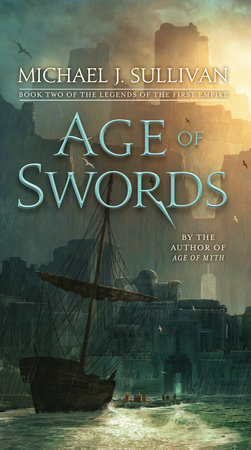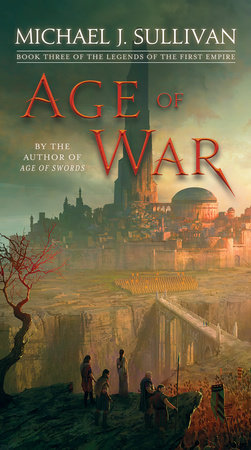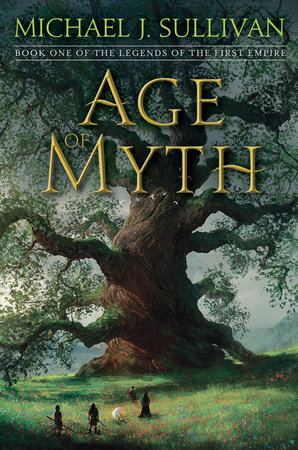Excerpt
Age of Swords
Chapter One
The Storm
Most people believe the first battle of the Great War occurred at Grandford in the early spring, but the first attack actually took place on a summer’s day in Dahl Rhen.
—The Book of Brin
“Are we safe?” Persephone shouted up at the oak.
Magda was the oldest tree in the forest, massive and majestic. Standing before her was like staring at an ocean or mountain; each made Persephone feel small. Realizing her three-word question might be too simple, too vague, she added, “Is there more that needs to be done to protect my people from the Fhrey?”
Persephone waited for an answer.
Wind blew; the tree shook, and a massive branch fell.
She jumped when it hit the ground. Falling from such a height, the limb would have killed her if it had landed a few inches closer. Broken branches suspended in the forest canopy were called widow-makers. Since Persephone had already lost her husband, the dead wood lying beside her must have been an overachiever.
“What’s that about?” Persephone asked Suri.
The young mystic with the white wolf glanced at the fallen branch and shrugged. “Just the wind, I think. Feels like a storm is coming.”
Once before, when Persephone had sought the great tree’s counsel, Magda’s advice had saved her people. Now she was back, seeking answers again. Months had passed since her last visit, and life at Dahl Rhen had returned to a comfortable routine. The destruction created by the battle between two Miralyith had been cleaned up, but Persephone knew that hadn’t ended the conflict. Questions remained—questions no human or Fhrey could answer. And yet . . .
Persephone looked at the fallen tree limb. It’s not a good sign when Magda starts a conversation by trying to crush me.
“Something wrong?” Arion asked. The Fhrey was still learning their language and stood beside Suri and Minna watching the proceedings with great interest. She wore the green hat Padera had crocheted for her; its whimsical quality made the Miralyith appear more approachable, less divine, more—human. Arion had come along to witness the oracle in action, although Persephone had expected more talk and less action.
Suri looked up at the tree. “Don’t know.”
“What’s Magda saying?” Persephone shouted to Suri over the rising howl of wind.
That was how it was supposed to work. Persephone posed questions to the tree and the mystic revealed the answer after listening to the rustling of leaves and branches. But Arion was right about something being wrong. Suri had a perplexed look on her face—more than merely puzzled; she looked concerned.
“Not sure,” the girl replied.
Persephone clawed a lock of hair away from her mouth. “Why not? Is she talking in riddles or just ignoring you?”
Suri’s face twisted in frustration. “Oh, she’s talking, all right, but so fast I can’t tell what she’s saying. Just babbling, really. Never seen her like this. She keeps repeating ‘Run . . . run fast . . . run far. They’re after you.’ ”
“They? Who? Is she talking to us? Is that the answer to my questions?”
Suri shook her head, short hair whipping across the tattoos on her forehead. “Nope. She was yelling before you said anything. I don’t think she heard you. I’m not even sure how Magda knows the word run. I mean, seriously, how does a tree know what that is?”
“Are you saying the tree is hysterical?”
Suri nodded. “Scared to death. I know mice who have made more sense. She’s not even using words now, just making noises.” Suri’s brows jumped up, her face tensing, eyes squinting, mouth pulling tight.
“What?” Persephone asked.
“It’s never good when a tree screams.”
Tall grass slapped Persephone’s legs, her dress whipping and snapping. Ripped from their branches, the oak’s leaves flew thick as snow in a blizzard. Under the dense canopy, Persephone couldn’t see the sky, but the wind was stronger than ever. Stepping out, she discovered that what had been clear blue just moments before had turned a tumultuous gray. Dark clouds bubbled one upon another, turning midday into twilight. A strange green light cast everything in an eerie, unnatural hue.
“What’s happening?” Arion asked.
“Tree is panicking,” Suri answered.
“Maybe we should return to the dahl,” Arion said, her head tilted up. “Yes?”
Minna whined and drew closer to Suri, nearly knocking the girl down. The mystic knelt to comfort her wolf. “Not right, is it, Minna?”
Looking more serious, Arion gave up speaking Rhunic and returned to her native tongue. “We need to—” She was cut off by a blinding flash and horrific crack.
Minna yelped and bolted down the slope.
Persephone staggered. Blinded by the afterimage that left a bright, splotchy band across her vision, she vainly tried to blink it away. Her nostrils filled with wood smoke, and she felt the heat of a blaze.
Magda is on fire!
Arion lay on the ground at the base of the tree, both hands raised, shielding herself. The Miralyith shouted a single word—nothing Persephone recognized—but it sounded like a command. The fire engulfing the old oak vanished with a pop. In its place was a terrible hiss and smoke swirling in a malevolent wind. Magda was split down the center, cleaved in two. A horrible blackened gash with bright-red edges flared with each gust of wind. The ancient and wondrous mother of trees had taken a mortal blow from the gods.
Persephone helped Arion to her feet.
“We need to run,” the Fhrey told them.
“What? Why?”
Arion grabbed her by the wrist and pulled. “Now!”
Persephone’s scalp tingled as Arion dragged her down the hill and out of the glade toward the thick shadow of the Crescent Forest. Suri and Minna were already ahead of them, sprinting.
Crack!
Lightning struck the ground somewhere behind them.
Crack! Crack!
Two more bolts rent the air close enough for her to feel their heat. Running together, Persephone and Arion followed Suri and Minna as they plunged headlong into the forest through thickets, brambles, and thorns. Gasping for air, Persephone glanced back. A series of scorch marks smoldered in a direct line between the oak and where they stood.
Crack!
They all jumped as the sound exploded directly overhead. Like the old oak, the trees above caught fire. One huge branch fell like a giant torch—another widow-maker wannabe.
“Need shelter,” Arion said, and pulled again.
“Rol nearby,” Suri shouted. “This way.” The girl dashed deeper into the wood, Minna bounding at her side.
Persephone might not understand the language of trees, but she understood anguish. The wood shrieked. Branches snapped; trunks groaned, and the forest cried out as the wind stripped away summer gowns of green. Then a new sound rose, a loud, all-encompassing roar from everywhere at once. At first, Persephone thought it might be sheets of rain, but the noise was much too loud, far too violent. Balls of ice tore through leaves and branches. Fist-sized missiles assailed the canopy, ricocheting off limbs and trunks. With arms raised over her head, Persephone screamed as two huge chunks of ice struck her back, glancing blows, but they carried the sting of a switch and the force of a punch.
Ahead, Suri stopped at the foot of a sheer, rocky cliff and slapped the face of it with her palm. To Persephone’s immense relief, a section of the stone’s face opened, revealing a little room neatly carved out of rock. The mystic leapt inside, followed closely by the wolf. From the doorway, Suri swung her arms in huge circles, waving the other women to safety. The chieftain of Dahl Rhen and the Miralyith crossed the threshold together, crouching to avoid hitting their heads. Once in, Persephone turned to witness the destruction.
Crack!
Another bolt of lightning split the air, and for an instant, a dazzling array of translucent shades of green illuminated the leaves, a light brighter than the sun.
Crack!
A nearby cottonwood caught fire. Sheared in half, the tree fell in a rain of sparks and flame. The wind fanned the fires started by the strikes, spreading an inferno—ice and fire, wind and debris. Persephone stared, lost somewhere between horror and awe.
Suri slapped the keystone, and the door closed.
Outside, the lightning cracks and hammering hail continued, but from a safe, muffled distance. Panting from the run and realizing they’d escaped without significant injury, the three exchanged the stunned looks of survivors. Relief washed over Persephone . . . until she noticed they weren’t alone.
Gifford would never win a footrace. Although he came to this realization late in life, everyone else knew it the day he was born. His left leg lacked feeling, couldn’t support his weight, and dragged. His back wasn’t much better. Severely twisted, it forced his hips in one direction and his shoulders in another. Most people pitied Gifford and a few even despised him. He never understood either.
Roan was the exception. What everyone else saw as hopeless, she took as a challenge.
The two were out in front of Gifford’s roundhouse, and Roan was lashing the wood-and-tin contraption to his left leg, tightening its leather straps. She knelt in the grass before him, wearing her work apron, a smudge of charcoal on the side of her nose. Her dark-brown hair was pulled back in a short ponytail so high on her head that it looked like a rooster’s crest.
Dozens of cuts from working with sharp metal marred her clever little hands. Gifford wanted to hold them, kiss the wounds, and take the pain away. He’d tried taking her hand once, and it hadn’t gone well. She’d pulled away, her eyes widened with fear, and a look of horror crossed her face. Roan had an aversion to being touched—Gifford had known that—he’d simply forgotten himself. Her reaction wasn’t limited to him. She couldn’t suffer anyone’s touch.
Yanking hard on the ankle strap, Roan nodded with a firm, determined expression. “That should do it.” She rose and dusted her clean hands symbolically. Her voice was eager but serious. “Ready?”
Gifford answered by pulling himself up with the aid of his crafting table. The device on his leg, constructed from wooden sticks and metal hinges, squeaked as he rose, a sound like the opening of a tiny door.
“Do you have your weight on it? Try. See if it holds.”
For Gifford, any attempt to support himself with his left leg was akin to leaning on water. But he’d gladly fall on his face for her. Perhaps he could manage a roll and make her grin. If he’d been born with two stout legs, strong and agile, he’d dance and twirl like a fool to amuse her. He might even make her laugh, something she rarely did. In her mind, she was still a slave, something less than nothing. Gifford longed for Roan to see herself the way he did, but damaged as he was, he made a poor mirror casting back a broken image.
Gifford tilted his hips, shifting some weight to his lame leg. He didn’t fall. A strain tugged on the straps wrapped around his thigh and calf, but his leg held. His mouth dropped open, his eyes widened, and Roan actually did smile.
By Mari, what an amazing sight.
He couldn’t help grinning back. He was standing straight—or as straight as his gnarled back allowed. Using magic armor fashioned by Roan, Gifford was winning an impossible battle.
“Take a step,” she coaxed, hands clenched in fists of excitement.
Gifford shifted weight back to his right side and lifted his left leg, swinging it forward. The hinges squeaked once more. He took a step the way normal people did a million times, and that’s when the brace collapsed.
“Oh, no!” Roan gasped as Gifford fell, barely missing the newly glazed cups drying in the morning sun.
His cheek and ear slammed into the hardened dirt, jarring his head. But his elbow, hand, and hip took the bulk of the punishment. To Roan, it must have looked painful, but Gifford knew how to fall. He’d been doing it his entire life.
“I’m so, so, so sorry.” Roan was back on her knees, bent over him as he rolled to his side. Her grin was gone, the world less bright.
“I’m okay, no pwoblem. I missed the cups.”
“The metal failed.” She struggled to hold back tears as her injured hands ran over the brace.
“The tin just isn’t strong enough. I’m so sorry.”
“It held fo’ a while,” he said to cheer her up. “Keep at it. You’ll make it wuk. I know you will.”
“There’s an added force when walking. I should have accounted for the additional weight when your other leg is raised.” She slapped the side of her head several times, flinching with each strike. “I should have realized that. I should have. How could I not—”
He instinctively grabbed her wrist to prevent additional blows. “Don’t do—”
Roan screamed and jerked away, drawing back in terror. When she recovered, they exchanged embarrassed looks, mirroring each other. The moment dragged unpleasantly until Gifford forced a smile. Not one of his best, but it was all he could manage.
To ease past the uncomfortable pause, he picked up the conversation where they’d left off, pretending nothing had happened. “Woan, you can’t know ev-we-thing when doing something new. It’ll be betta next time.”
She blinked at him twice, then shifted her focus. She wasn’t looking at anything in particular; she was thinking. Sometimes Roan thought so intently that he could almost hear it. She blinked again and emerged from the stupor. Walking over to Gifford’s crafting table, she picked up one of his cups. The awkward moment vanished as if it had never happened.
“This design is new, isn’t it?” she asked. “Do you think it could hold its shape at a much larger size? If we could find a way to—”
Gifford’s smile turned genuine. “Yew a genius, Woan. Has anyone told you that?”
She nodded, her little rooster crest whipping. “You have.”
“Because it’s twue,” he said.
She looked embarrassed again, the way she always did when he complimented her, the way she looked when anyone said something nice, a familiar unease. Her eyes shifted back to the brace, and she sighed. “I need something stronger. Can’t make it out of stone; can’t make it out of wood.”
“I wouldn’t suggest clay,” he said, pushing his luck at trying to be funny. “Though I would have made you a beautiful hinge.”
“I know you would,” she said in complete seriousness.
Roan wasn’t one for jokes. Much of humor arose from the unexpected or preposterous—like making a hinge out of clay. But her mind didn’t work that way. To Roan, nothing was too absurd and no idea too crazy.
“I’ll just have to think of something,” she said while unbuckling the brace. “Some way to strengthen the metal. There’s always a better way. That’s what Padera says, and she’s always right.”






